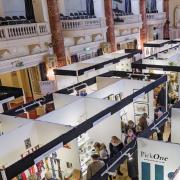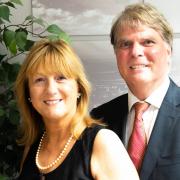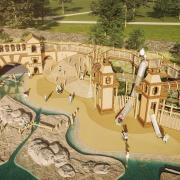Lord Paul Drayson: Engineer, entrepreneur, businessman, racing driver, former UK Minister of Science and always an enthusiast for life

When the scientific community cracks the art of cloning, Lord Drayson should be first in the queue, because Britain needs a few more like him at the moment. Clever, self-motivated people make a huge contribution to the UK’s employment and economy. It helps if they have a strong social conscience too.
Lord Drayson, who lives near Stroud, ticks these boxes. He served in the Government from 2009-2010, helping steer the UK economy through some of its darkest years after Lehman Brothers, latterly as Minister of State in the erstwhile Department for Business, Innovation and Skills. Here he was responsible for science and innovation, devising plans to introduce manufacturing tax credits, the Patent Box and the UK’s Catapult programme: a network of world-leading centres aimed at transforming the UK’s capability for innovation and drive economic growth.
We meet the week after Brexit. There is a vacuum of leadership at the top of our political parties, which we are all fervently hoping will be filled by the time this interview is published.
But out of uncertainty comes opportunity. “I am so positive about the future of this country, which is built on the talent and expertise of our people,” says Lord Drayson. “One thing I learned as science minister after the crash of 2008/09 was that this country hadn’t looked after manufacturing properly. We can be competitive but to prosper, government must provide access to the markets and strong policies.”
In 2009 the British Government, led by Prime Minister Gordon Brown, was holding regular emergency response committee COBRA meetings. Lord Drayson, as one of the few ministers in the Government with relevant business and scientific experience, was charged with developing policies to support British business.
“It was a really fertile time for ideas relating to skills investment and taxation policy,” he says. “Opinion then was: ‘it’s nice to have manufacturing but we’re in the post industrial age now and it’s all about moving money around’.
He pauses, to make sure I get the message. “NO IT ISN’T. One good byproduct of the 2008 crash was the ‘oh my god’ moment when everyone realised we needed a balanced economy and should depend more on our ability to make things.”
A country is defined in part on what it makes for the rest of the planet, he says. “It’s part of our personality. Things like the catapult programme came out of our analysis of other countries: It’s also about raising the profile of industries and giving them a bit of sizzle, so that young people can see how much they have to offer.”
Where has this passion come from? Strong parental support gave him ambition and context. “My parents grew up during the Second World War and I was lucky to know my grandparents, who lived in London during the blitz, in fact a V2 rocket landed opposite their house. My grandfather was a welding foreman in Woolwich, and three of his brothers were killed. It gave me a sense of history. The family was working class but through the opportunities of education I built a different life. My upbringing gave me the sense that this freedom was hard won, don’t waste it.”
Paul became fascinated with physics. “It helps us understand how the world actually works.” Growing up near the motor racing circuit of Brands Hatch, and visiting regularly with his dad, he also became interested in cars.
“Through science and engineering I discovered the complexity and beauty of the world. When I did my PhD I also discovered I loved being my own boss.” Paul pays tribute to his university professor Keith Foster, who challenged him to think of a PhD topic that could set the world alight. “He asked me: What do you want to research? What are you interested in? What do you care about and what is going to be your contribution?” He picked robotics as his PhD subject.
At 18, Paul had decided it would be really cool to have his own factory to make things. At 26, he was running the Lambourn Food Company, a business based on novel manufacturing technology, developed with venture capital backing. “It was very hard work, especially during the recession at the end of the 1980s.” After selling the business, in 1993 he co-founded Oxford University spinout company PowderJect Pharmaceuticals Plc with his wife Elspeth. Four years later it floated on the London Stock Exchange and he built it into one of the world’s leading vaccine companies with operations in the UK, USA and Scandinavia, before its acquisition for £540 million in 2003.
It was during his tenure as chair of the BioIndustry Association from 2001-2003 that he discovered the power of politics. At that time the industry was being attacked by animal rights extremists.
“People were claiming that some cosmetics, such as those sold by The Body Shop, are not tested on animals. Of course they are not tested on animals, they don’t need to be because the chemical entities used in their development were tested on animals years ago.” The law requires all countries across the world to test medicines on animals. “It’s the law and the only way to determine whether a medicine is safe and effective. We cannot confuse this with cruelty to animals in other areas.”
People he worked with were being attacked, but didn’t talk about it, preferring to keep their heads down. “I and others felt this couldn’t go on. We needed to persuade Government to support the industry.” Their advice was heeded. “And I discovered in my 30s that, big surprise, politics works.”
Lord Drayson is attracted to difficult problems. “The first thing is to overcome a difficulty, then you get to something that’s really worth doing. When I started motor racing, I didn’t just want to play at it, I wanted to race at Le Mans.” He competed in the Le Mans 24-hour race in 2009 and 2010. “When I became interested in politics, I wanted to get in the Cabinet. What matters is that the things you do make other things happen, but you have to be prepared to walk the miles that are necessary to achieve them.”
From 2002–2005 he chaired a fundraising campaign to build a children’s hospital at John Radcliffe Hospital in Oxford and since 2003, he has been the entrepreneur-in-residence at the Saïd Business School, Oxford University.
Drayson Racing Technologies was founded in 2007. A motorsport research and development business, it focusses on environmentally sustainable technology and has achieved a number of firsts in the emerging field of e-racing, including pioneering wireless charging.
Most recently he has established Drayson Technologies Limited, developing wireless charging technology and machine learning software to create smart sensor networks.
The company has developed Freevolt, a patented, pioneering new technology that provides power for low energy Internet of Things by harvesting radio frequency energy from wireless and broadcast networks such as 2G, 3G, 4G, WiFi and Digital TV.
The first product is CleanSpace, a portable, connected air sensor that detects air quality and can send data collected via Bluetooth to a mobile phone. It’s about to undergo further testing in Mexico City, where air pollution is worse than almost anywhere else in the world.
The Drayson family moved to Stroud in 2006. Clearly air pollution is considerably less of a problem across the Five Valleys, despite its strong industrial heritage. “One reason I love having a house near Stroud is that it’s still a manufacturing hub” (he’s right, I was recently told that there are 300 manufacturers there). “That’s really cool. The Cotswolds is grounded somehow, but it’s not well understood and I wasn’t aware of it until I moved there. The valleys have a strength of character.”
Lord Drayson is in a hurry. “I have a sense of life going really fast, and it’s a race to do as much as I can to use time well. I want to feel I made a difference.” Would he consider going back into politics? Yes. But he wants to urge others to consider it too.
“You can change things. I wasn’t into student politics, I was an entrepreneur businessperson, but politics came to me because something affected me. Never has there been a clearer example than what’s happening in the world now. Get involved, join a party. Any party. Don’t just let things happen. Make a difference, and that’s particularly true for young people.
“Yes we are all busy, running companies or working in them. But government doesn’t have enough people from manufacturing in politics. At the end of the day this country has to pay its own way. We have the skills and knowledge and our voices should be heard.
“This is a wonderful world. Choose what you care about and do something about it.”



























